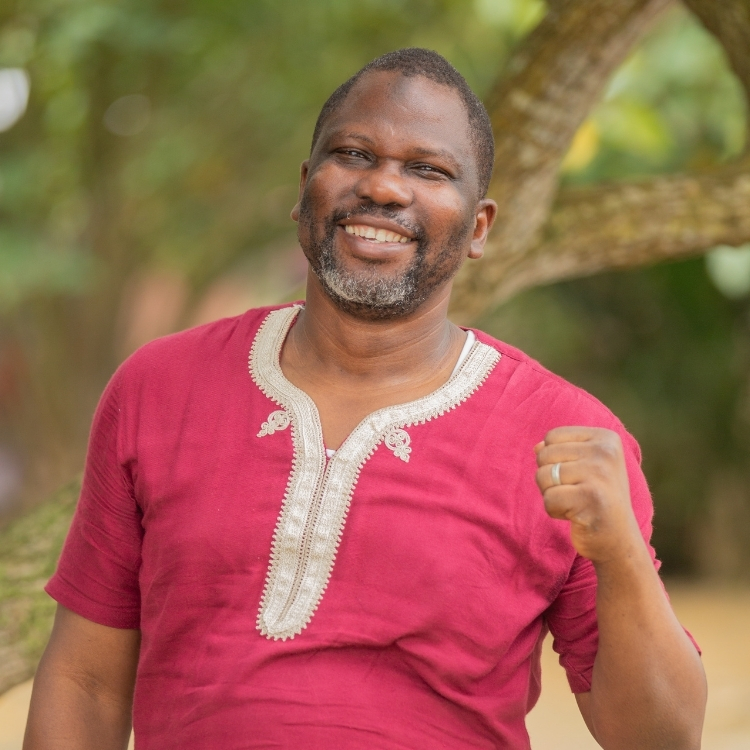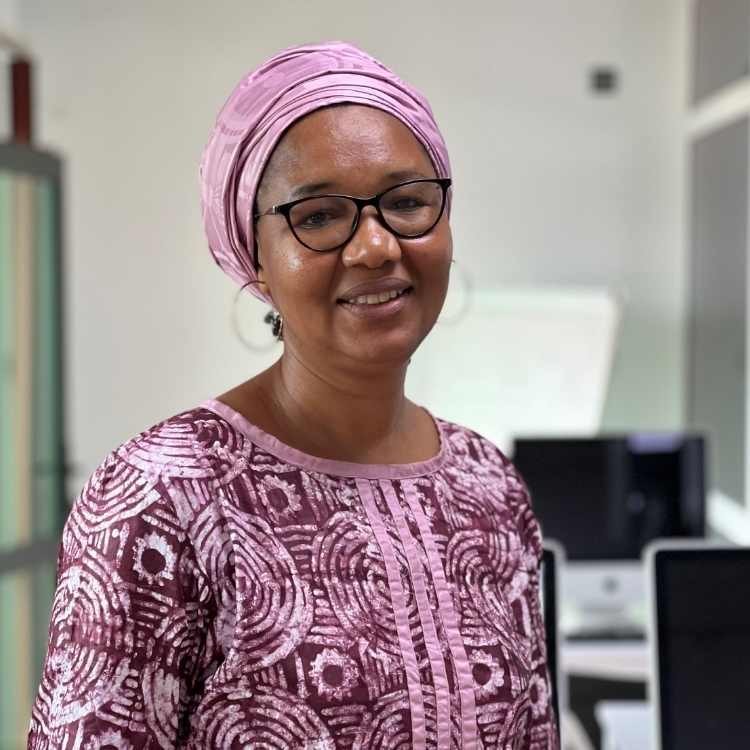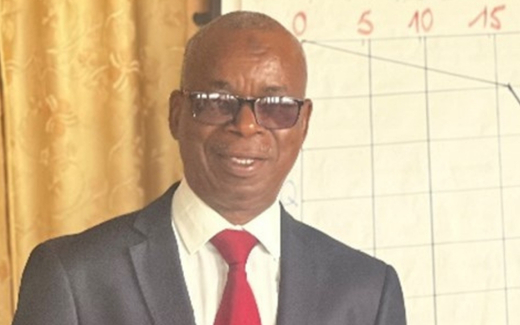Blog
Connected Communities multimedia series
This story is part of IFC’s Connected Communities multimedia series. Click here to view other stories from the series.
Blog
December 18, 2023

Bamoussa Sanogo, Côte d’Ivoire
When the covid-19 pandemic derailed in-person business skills training in Côte d’Ivoire, Bamoussa Sanogo, trainer and senior manager of Africa Business Explorer, pivoted. “With the support of IFC, I earned my advanced master trainer certification and started offering online courses,” he says. This pandemic-era shift enabled his business to grow, while giving local entrepreneurs—especially women—skills they need to succeed.
Bamoussa’s licensing—an IFC-supported accreditation through the Learning and Performance Institute (LPI)–qualified him to train other business trainers. It’s a critical need in Côte d’Ivoire, a resource-rich country where IFC’s engagement includes ensuring that local communities—including women and youth entrepreneurs—can share in the economic benefits of natural resource operations. “In Côte d’Ivoire we now have the ability to certify other trainers,” Bamoussa says. “In the past, we had to bring in master trainers from abroad.”
Aïssatou Diallo Barry, director of the Conakry Institute of Social Management (Institute de Gestion Sociale), also obtained her master trainer certification thanks to the program. Over the past five years, she has facilitated 12 train-the-trainer workshops in Côte d’Ivoire and Guinea, certifying about 80 trainers.
IFC’s work with Bamoussa, Aïssatou, and other veteran trainers improves the effectiveness and quality of business training, and makes it more inclusive, scalable, and sustainable. Training of trainers is one component of the broader Canada-IFC Local Economic Development Program linked to infrastructure investment in Côte d’Ivoire, Ghana, Guinea, and Kenya. As of 2022, 208 trainers have been trained, of whom 83 are women. Of the total cohort, 61 trainers have continued on to earn their master LPI certification.
About 4,500 have already seen business benefits after receiving training delivered by these professionals. Case-in-point: All 12 of the women entrepreneurs who participated in a Côte d’Ivoire workshop conducted by IFC-trained trainers implemented changes and improved their operating models, enabling them to access $53,000 in new financing.
According to Bamoussa, adopting the LPI methodology, a blend of business basics and hands-on practice, completely changed his instructional approach. “Entrepreneurs are coming to you because they want solutions they can use right away. This methodology teaches instructors to get straight to the point.”
The flexible approach encourages trainers to adapt their styles so they can meet adult learners’ needs. This way, the learning resonates even among those who lack a formal education. “It’s a methodology that can be applied to everyone, regardless of whether you are an office worker or a microentrepreneur without much schooling,” says Gabriel Atchori, a certified trainer in Côte d’Ivoire.
The support extends beyond the classroom for these trainers. It has given them newfound connections to a global community of like-minded professionals. The IFC-hosted Grow, Learn, Connect platform lets trainers access continuing learning opportunities and allows for knowledge sharing and engagement. It includes a directory of certified trainers, so companies and organizations in search of local trainers can quickly find the resources they need.
The certification process, with its emphasis on culturally appropriate instruction, also reinforces approaches to the classroom that tailor content and delivery to women’s needs. The methodology reflects an understanding that women’s and men’s circumstances are different—and that the learning environment needs to reflect these differences. In her classes, Aïssatou teaches novice trainers to engage with men and women in equal measure and to encourage women to speak up. “When women and men are in a mixed setting, women are sometimes intimidated by men,” she explains.
Bamoussa notes that attracting women participants can be challenging in rural areas, where many natural resource operations are located. “Here, women often don’t have the same status as men, so you cannot train women the same way as you train men.” His company has adopted approaches introduced in the master trainer program that engage more women, including hiring additional women trainers. “Forty percent of our trainers are women today,” Bamoussa says. “This makes sense because we are doing more training that includes women.”
“By training one becomes a trainer”

Aïssatou Barry, Guinea
As local demand for trainers grows, the trainers themselves are applying their new knowledge and skills, and further elevating the profession to enhance learning outcomes. “There’s an old African saying that you only become a blacksmith by forging,” says Aïssatou. “The same can be said for the training profession. It is by training that one becomes a better trainer.”
The professionalization of the local training industry has catalyzed growth. “When I remember my beginnings and see myself now, there has been such a great progression,” says Aïssatou. “A lot of the opportunities I’ve had are through the IFC program.” She has built a robust website, added e-learning options, and hired more staff. She has also expanded her course portfolio, adding offerings in marketing, operations management, health and safety management, and computer skills.
Bamoussa’s business is growing as well. He has increased his staff by 40 percent because of all the new contracts. “I couldn’t have achieved this without the IFC training program and certification,” he says.
The growth in the local industry has created a pipeline of qualified trainers to support IFC’s ongoing operations, as well as assisting with IFC clients’ community development and local content programs. For example, Aïssatou has provided trainers for IFC local economic development and community engagement programs, including for Rio Tinto. And Gabriel has supervised training for women so they could qualify for job opportunities with IFC’s energy client Azito.
Such efforts are strengthening local economies and paving the way for resilient and more sustainable small businesses, connecting them with the value chains of larger companies at a time when opportunities abound.

“After the IFC training, I was able to train practitioners, operational people in the field. The training helped me adapt my modules according to this specific group. Otherwise, it would have been too abstract and theoretical. It gave me all the technical skills elements I needed to impart, while showing me how to modify the instruction to meet their needs.”
Marie Yvonne Curtis, Independent Trainer, Guinea

“Entrepreneurs are coming to you for training because they want solutions they can use right away. The LPI methodology shows you how, as an instructor, to get straight to the point.”
Bamoussa Sanogo, Trainer & Senior Manager of Africa Business Explorer, Côte d’Ivoire

“The greatest added value of the LPI certification process is that I learned to adapt my pedagogical approach to meet the level of the learners. By communicating in a clear and simple way, I am more confident that they will grasp a new notion and that they will be able to apply it.”
Aïssatou Barry, Trainer & Director of the Conakry Institute of Social Management (Institute de Gestion Sociale), Guinea

“When you are training young people, your approach has to be different. It’s all about embedding the entrepreneurial mentality early. I always ask them to focus on their future and what they aspire to. And then I explore with them how they can organize and take charge of their lives so they can realize these entrepreneurial dreams.”
Gabriel Atchori, Independent Trainer, Côte d’Ivoire

“I got into training because a good education is missing for many young Guineans—especially Guinean girls. I realized that the best way I could contribute to the development of my country was to give people the skills they are lacking so they can improve their job performance and position themselves for advancement.”
Fatou S. Hann, Trainer & Executive Director of Wafrica, Guinea

“A big takeaway from the LPI certification process was the importance of altering our training approach for women. Rather than gathering everyone in a classroom, we prioritize visits to the workplace. So if it’s a gardening collective we come to the field and bring together all the women to discuss the business aspects of the activity in terms they understand.”
Dr Alpha Balde, Trainer & Director of PRIDE, Guinea
This story is part of IFC’s Connected Communities multimedia series. Click here to view other stories from the series.

Blog

Interview
This site uses cookies. By continuing to browse the site, you are agreeing to our use of cookies.
OKLearn moreWe may request cookies to be set on your device. We use cookies to let us know when you visit our websites, how you interact with us, to enrich your user experience, and to customize your relationship with our website.
Click on the different category headings to find out more. You can also change some of your preferences. Note that blocking some types of cookies may impact your experience on our websites and the services we are able to offer.
These cookies are strictly necessary to provide you with services available through our website and to use some of its features.
Because these cookies are strictly necessary to deliver the website, refusing them will have impact how our site functions. You always can block or delete cookies by changing your browser settings and force blocking all cookies on this website. But this will always prompt you to accept/refuse cookies when revisiting our site.
We fully respect if you want to refuse cookies but to avoid asking you again and again kindly allow us to store a cookie for that. You are free to opt out any time or opt in for other cookies to get a better experience. If you refuse cookies we will remove all set cookies in our domain.
We provide you with a list of stored cookies on your computer in our domain so you can check what we stored. Due to security reasons we are not able to show or modify cookies from other domains. You can check these in your browser security settings.
We also use different external services like Google Webfonts, Google Maps, and external Video providers. Since these providers may collect personal data like your IP address we allow you to block them here. Please be aware that this might heavily reduce the functionality and appearance of our site. Changes will take effect once you reload the page.
Google Webfont Settings:
Google Map Settings:
Google reCaptcha Settings:
Vimeo and Youtube video embeds:
You can read about our cookies and privacy settings in detail on our Privacy Policy Page.
Privacy Policy